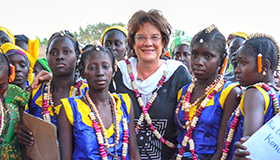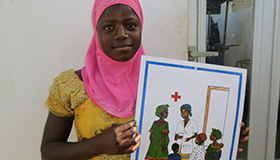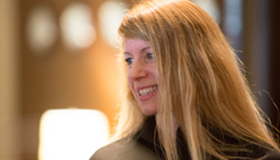Tostan
Community-Led Change of Harmful Social Norms
 Effecting major social change often requires a fundamental shift in how communities are engaged to act differently. No organization reflects this understanding better than Tostan, a Senegal-based NGO. "For almost 30 years, Tostan has catalyzed community-led development in Africa to achieve sustainable transformation in a number of areas. This transformation includes the improbable: a shift away from deeply entrenched, age-old practices that harm women and girls and a movement toward full recognition of the human rights of all people.
Effecting major social change often requires a fundamental shift in how communities are engaged to act differently. No organization reflects this understanding better than Tostan, a Senegal-based NGO. "For almost 30 years, Tostan has catalyzed community-led development in Africa to achieve sustainable transformation in a number of areas. This transformation includes the improbable: a shift away from deeply entrenched, age-old practices that harm women and girls and a movement toward full recognition of the human rights of all people.At the heart of Tostan's approach is the Community Empowerment Program (CEP), pioneered by Tostan's founder Molly Melching, in close collaboration with rural communities and a local pedagogical team. This process is centered on a core belief that change must come from within the community itself. The CEP respectfully meets communities where they are by engaging facilitators from the region—who speak the local language—to offer classes to adults and adolescents using methods that originate in their own cultural traditions, such as theater, storytelling, and art; electing Community Management Committees (CMCs), which will continue to lead the future development initiatives chosen by the communities during the CEP; and empowering women as leaders, growing their economic independence and creating a rare opportunity to drive positive change.
"A wide-lens perspective on violence resonates deeply with us at Tostan. Through our empowering education program implemented in rural communities in six countries in West Africa, we have seen time and again that with the right approach and strategies, entire social networks are ending these deeply entrenched harmful practices."
Over the years, Tostan has recognized the importance of working closely with influential local community and religious leaders on issues such as ending female genital cutting (FGC), child and forced marriage, and domestic violence. As a result of Tostan's close collaboration with these leaders, many are now at the forefront of a movement to ensure that human rights and responsibilities are respected within their communities.
 In 1997, for example, Tostan began working with Demba Diawara, a village chief and imam in Senegal, who shared his philosophy that "a family includes more than just those in one village" and that achieving real change requires activating an entire social network, beyond just an immediate locale. Diawara responded to the goal of local women who wanted to end FGC by reaching out to mobilize 13 communities where relatives and other members of his ethnic group lived. He deftly managed complex relationships with community elders and youth, encouraging dialogue around subjects that were previously taboo. This spurred interconnected communities to collectively decide to abandon these harmful practices in a public declaration in February of 1998.
In 1997, for example, Tostan began working with Demba Diawara, a village chief and imam in Senegal, who shared his philosophy that "a family includes more than just those in one village" and that achieving real change requires activating an entire social network, beyond just an immediate locale. Diawara responded to the goal of local women who wanted to end FGC by reaching out to mobilize 13 communities where relatives and other members of his ethnic group lived. He deftly managed complex relationships with community elders and youth, encouraging dialogue around subjects that were previously taboo. This spurred interconnected communities to collectively decide to abandon these harmful practices in a public declaration in February of 1998.
Today Tostan reports that more than 8,830 communities across eight African countries have participated in more than 112 public declarations declaring their intent to abandon harmful social norms, such as FGC and child and forced marriage.
"A person's family is not limited to their village alone. The family includes one's entire social network: their relatives in many villages, in all of the places they marry, even in far off countries like France and the United States. If you truly want to bring about widespread change, they must all be involved."
So, how can Tostan scale up its proven model to reach hundreds of thousands more girls and women across West Africa? In 2011, a Bridgespan team worked with Tostan on this question to create a plan for The Breakthrough Initiative, a six-year program to expand its work across the region. The team developed a written prospectus and additional materials for Tostan to raise a $42 million pooled-growth capital fund to expand its program to 1.35 million people in six West African countries, including Guinea, Guinea-Bissau, Mali, Mauritania, Senegal, and the Gambia. (Bridgespan drew on past work with growth capital campaigns in the US.)
 The first effort proved overly ambitious. However, when Tostan took this model and relaunched it as a $20 million campaign, it found significant success. Today, tens of thousands of rural West African community members are enrolled in Tostan's Community Empowerment Program thanks to this new pooled-funding growth approach.
The first effort proved overly ambitious. However, when Tostan took this model and relaunched it as a $20 million campaign, it found significant success. Today, tens of thousands of rural West African community members are enrolled in Tostan's Community Empowerment Program thanks to this new pooled-funding growth approach.
In addition, not only did the growth capital allow Tostan to scale, it also now serves as a model for other NGOs by demonstrating an innovative and efficient funding mechanism.
"We feel privileged to work with visionary leaders like Molly Melching who taught us how to bring about real societal change using a human rights-based approach, with respect and human dignity as the foundation. She makes clear what's possible—that we can ensure that children around the world are educated, safe, healthy and able to reach their full potential. It informs our work and is a powerful model for others."
Photos courtesy of Tostan
